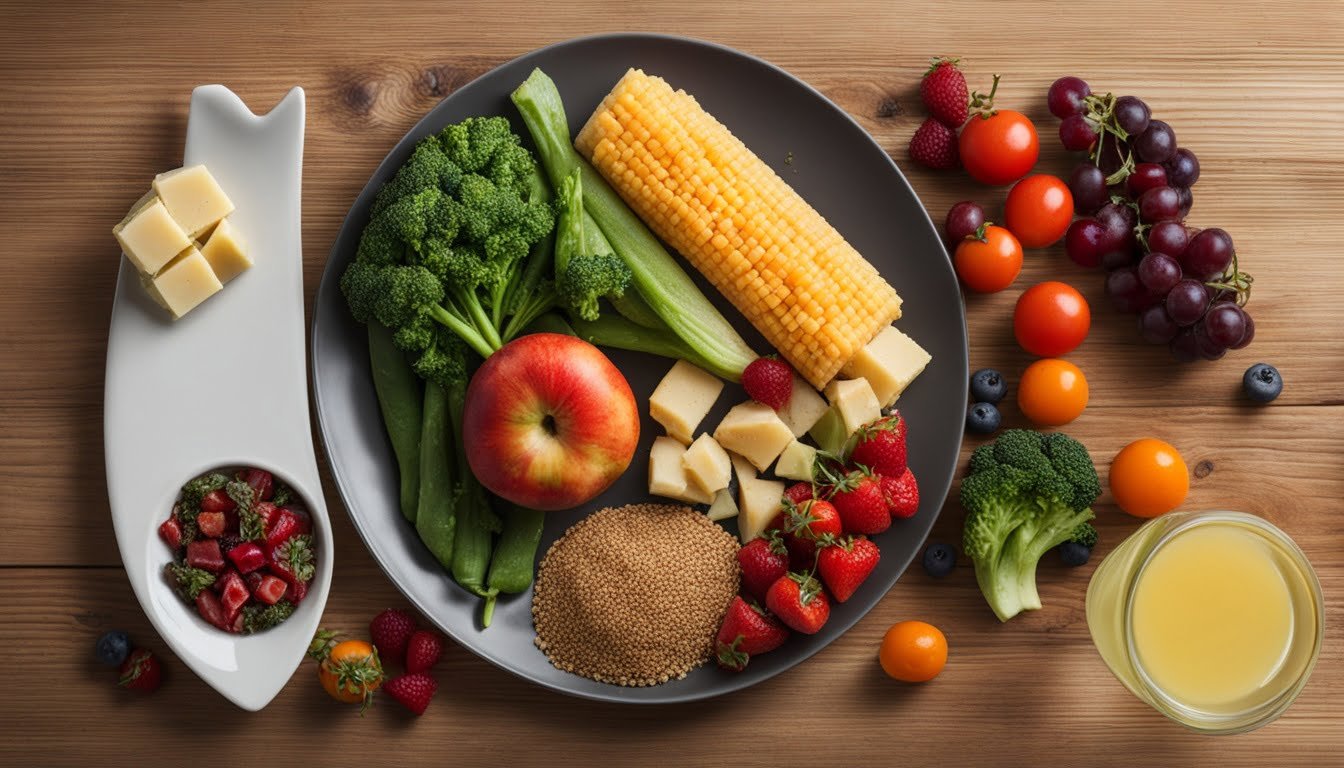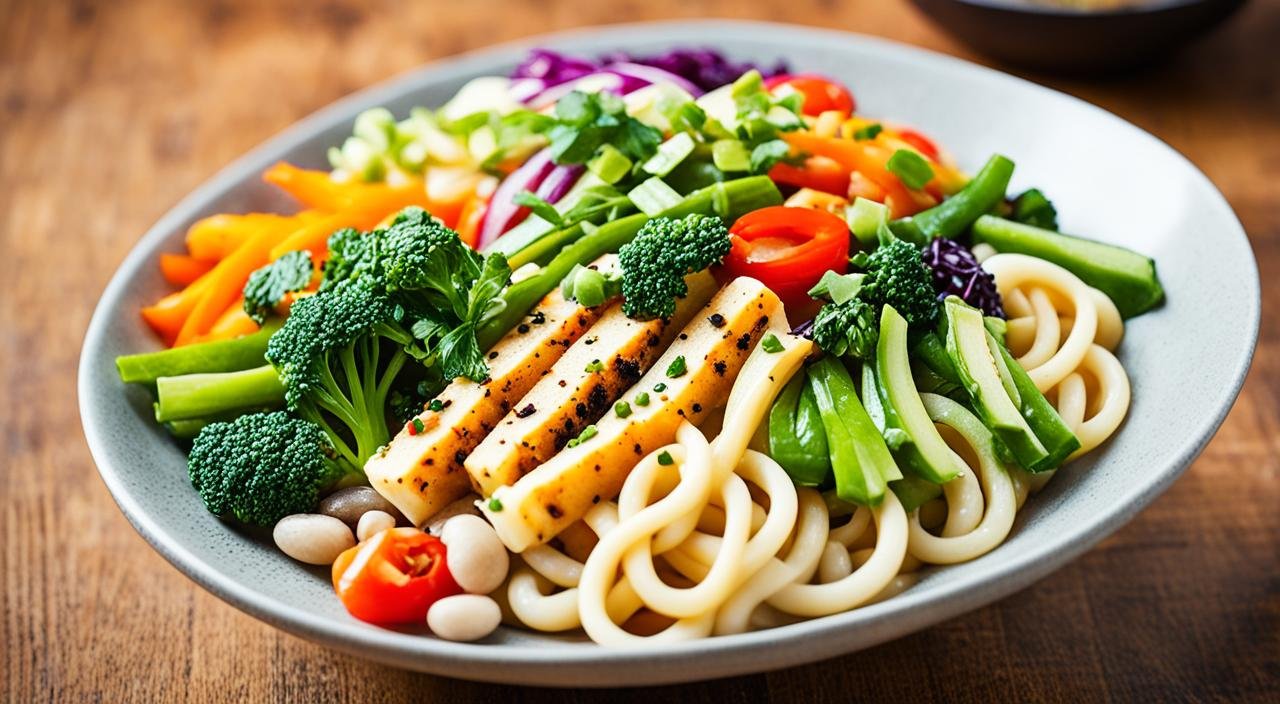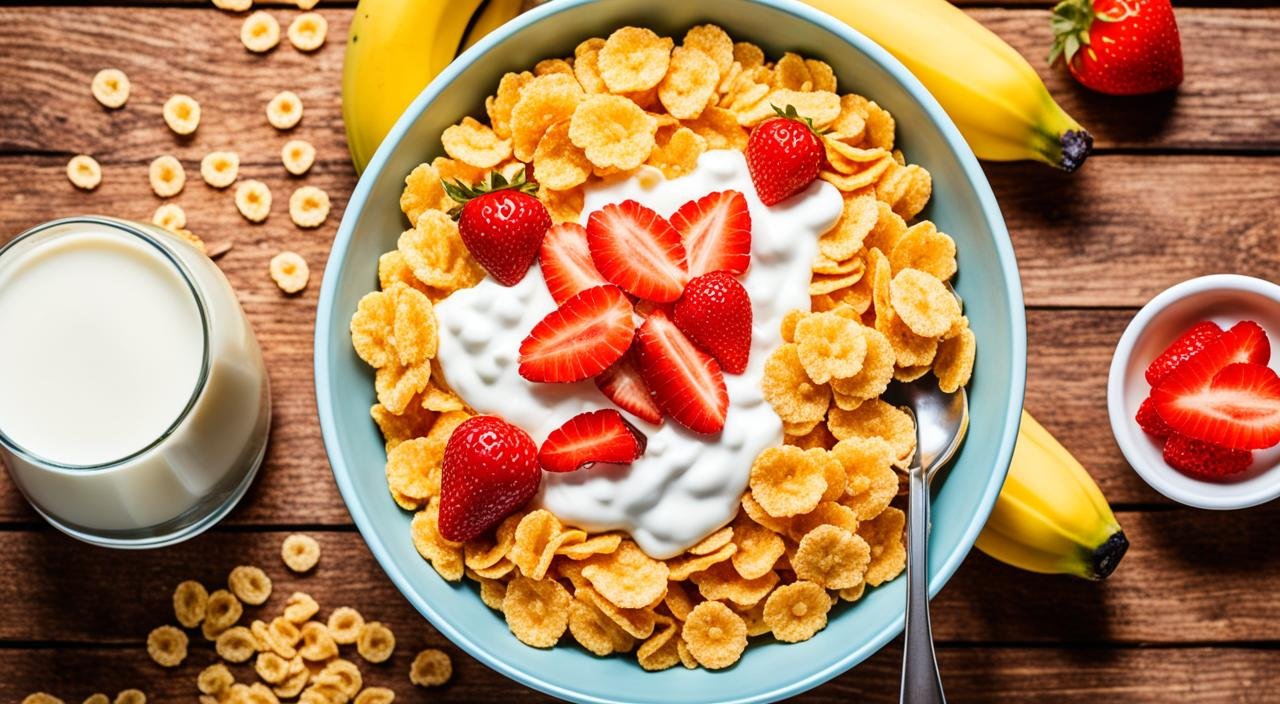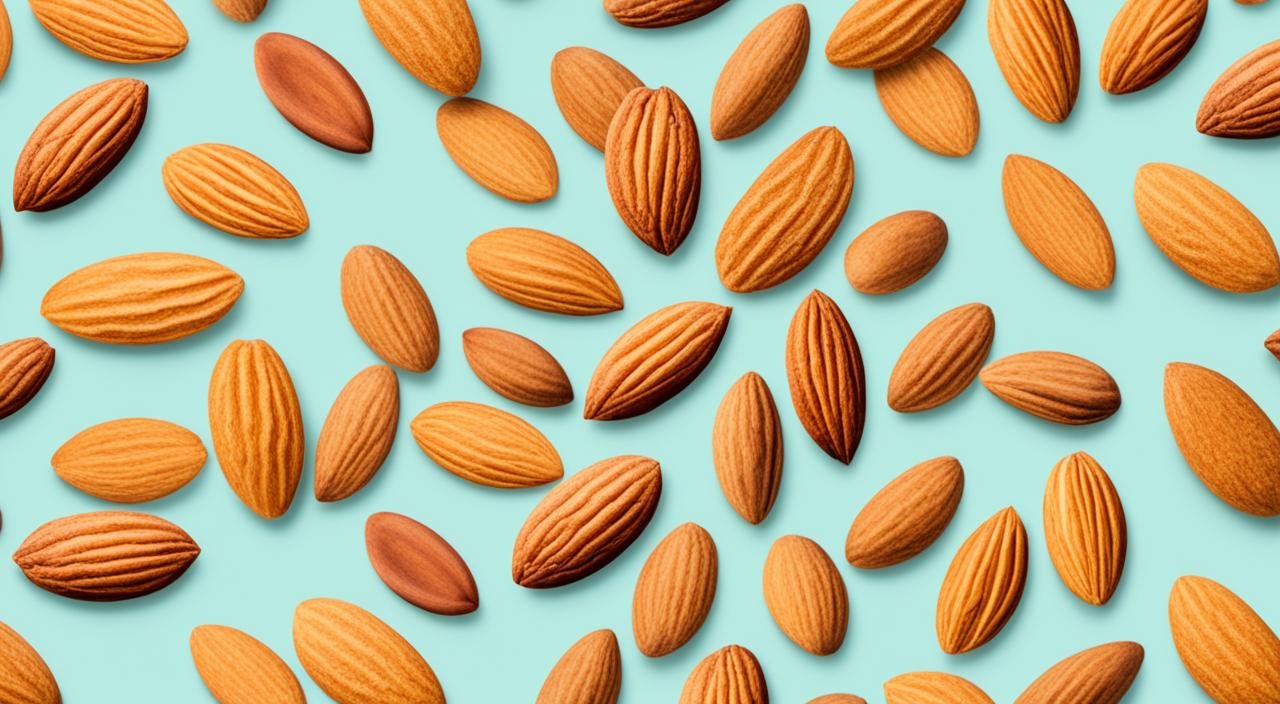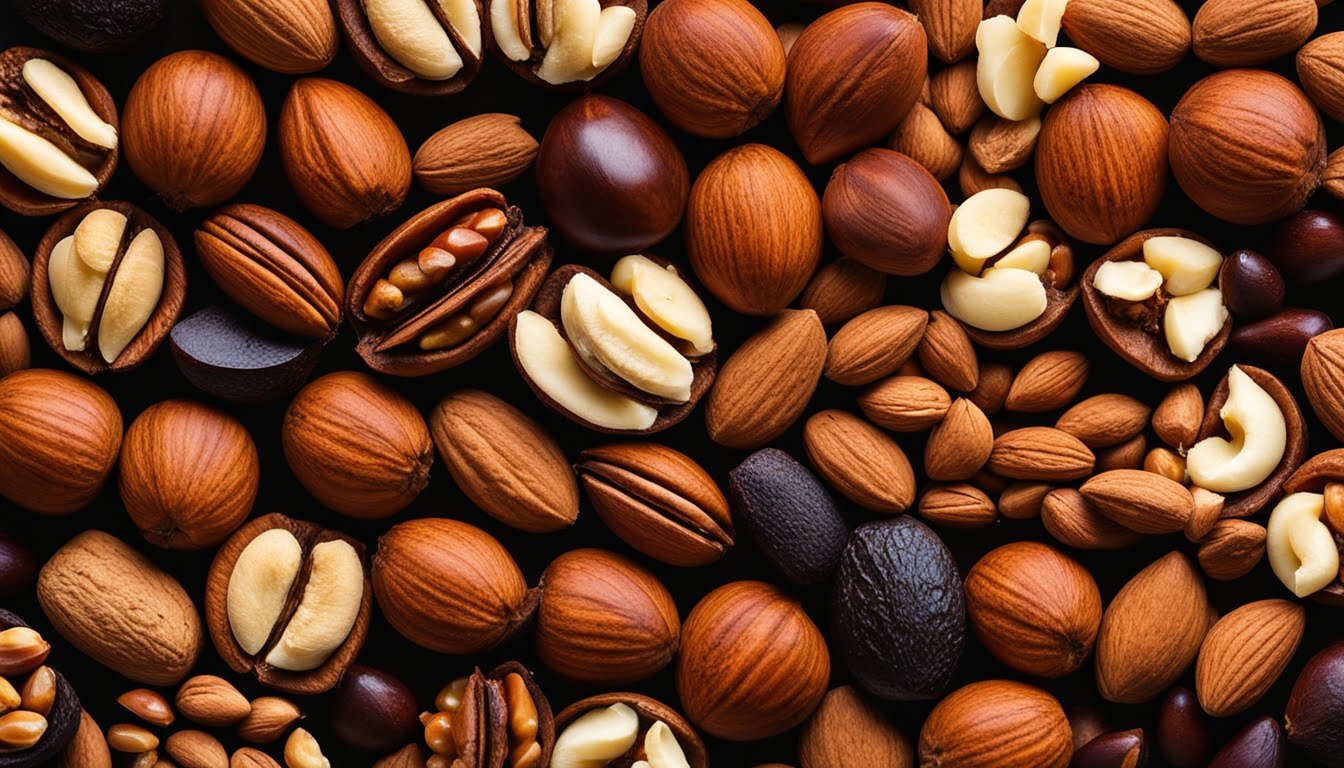Going on a gluten-free diet can sometimes make you have diarrhea at first. This happens because your eating habits have changed. But, it’s important to figure out why this is happening so you can fix it. Many folks stop eating gluten to feel better. This may be because they have an illness like celiac disease. Or, they might just think it makes them healthier overall.
But, simply dropping gluten from your meals doesn’t mean all tummy troubles vanish. If you still have diarrhea after cutting out gluten, you need to look deeper. There could be other issues at play that need attention.
Key Takeaways
- Adopting a gluten-free diet can sometimes lead to diarrhea initially due to dietary changes.
- Identifying the underlying cause of persistent diarrhea on a gluten-free diet is crucial for finding effective solutions.
- Factors like adjusting to a new diet, nutrient deficiencies, and underlying digestive issues may contribute to diarrhea on a gluten-free diet.
- Seeking professional guidance from a healthcare provider can help address the root cause of diarrhea and support overall gut health.
- Maintaining a balanced, nutrient-dense gluten-free diet and addressing any underlying digestive concerns are essential for managing diarrhea and promoting overall well-being.
Understanding Gluten and Its Impact
Gluten is a protein found in wheat, barley, rye, and other grains. It causes trouble for people with celiac disease. They face an immune system attack that harms their small intestine’s lining. This damage stops nutrients from being absorbed, causing problems like bloating and fatigue.
What is Gluten?
Gluten is a protein in grains like wheat, barley, and rye. It does more than stick food together. It gives bread and cakes their shape. But, it can be harmful for some, leading to stomach issues and more.
Symptoms of Gluten Sensitivity
People sensitive to gluten face a range of symptoms. These include tummy problems and issues like brain fog and skin rashes. Switching to a gluten-free diet often helps lighten these symptoms.
Celiac Disease and Gluten Intolerance
Celiac disease attacks gluten, harming the gut’s lining. This trouble stops nutrients from getting absorbed. Non-celiac gluten intolerance makes folks feel ill after gluten, yet it doesn’t harm the gut like celiac does.
Can a Gluten Free Diet Cause Diarrhea?
Many times, people are advised to switch to a gluten-free diet if they have celiac disease or gluten intolerance. This change can reduce digestive problems like diarrhea. But, some may still have or get diarrhea even after they stop eating gluten. There are many reasons for this. Examples include finding it hard to change their diets, not getting enough nutrients, and other stomach problems not related to gluten.
Even after going gluten-free, some with celiac disease still feel sick. A study showed that 18 of 20 people with celiac disease kept having symptoms because of other food issues, like trouble digesting fructose or histamine.
People might also have trouble digesting lactose if they go gluten-free. This happens more often than in the general population. Sometimes, people accidentally eat gluten. This can also cause ongoing sickness for those trying to avoid gluten.
When someone has celiac disease or gluten sensitivity, they might lack certain vitamins. These include Vitamin D, Iron, B12, and others. Not having enough of these vitamins can make stomach problems like diarrhea worse. In 2019, a report said that people with celiac who eat gluten-free food might gain weight. This happens because many gluten-free foods have more vegetable fats.
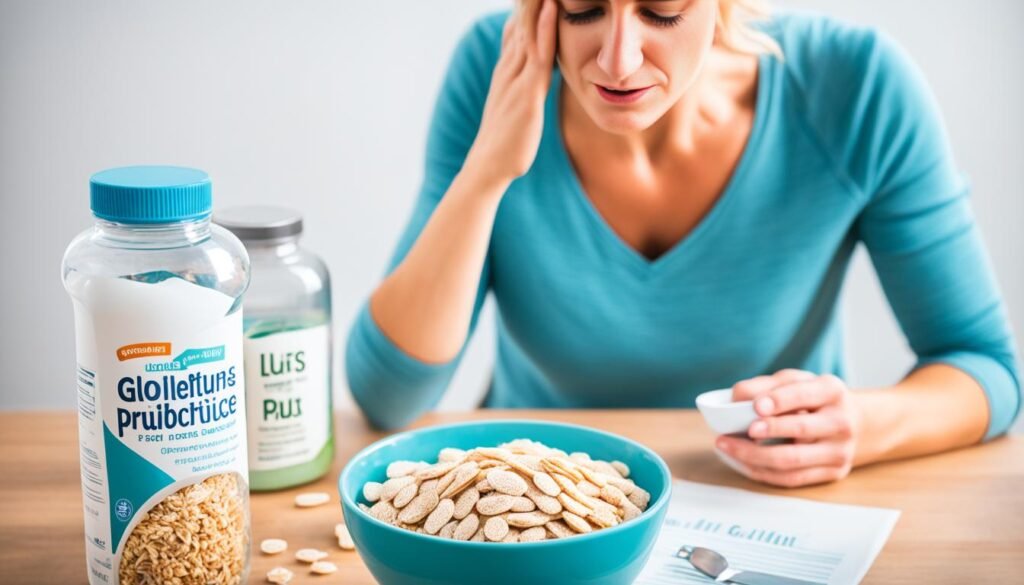
Switching to a gluten-free diet can be hard. It might take the body some time to get used to it. Even after cutting out gluten, certain health issues can still cause diarrhea. These include poor digestion and problems with the gut’s good bacteria.
It’s good to know if your body really needs gluten before changing your diet. Some people worry about dairy products like heavy cream when they stop eating gluten.
Dietary Changes and Digestive Issues
Making the switch to a gluten-free diet is a big step. It might take time for your stomach to get used to it. You might see more diarrhea or other tummy troubles at first. If you’re not careful with your gluten-free diet, you might not get enough fiber, vitamins, and minerals. Missing out on these can make digestion even harder, leading to more diarrhea.
Adjusting to a New Diet
Changing to a gluten-free diet means changing what you eat. It’s not always easy, and your body may struggle a bit as it gets used to new foods. At the start, you might see more diarrhea or stomach issues as everything settles.
Nutrient Deficiencies and Imbalances
If you’re not careful, a gluten-free diet might not give you enough fiber, vitamins, and minerals. Grains like wheat and barley are often full of these good things. Taking them out can make it tough to get what your body needs. This can mess with your digestion, causing more diarrhea.
To make things better, focus on eating lots of whole, gluten-free foods. Think of fruits, veggies, beans, and good grains. Sometimes, you might need to take supplements to fill in any nutrient gaps. This can help make sure you’re getting enough fiber, iron, and B vitamins.
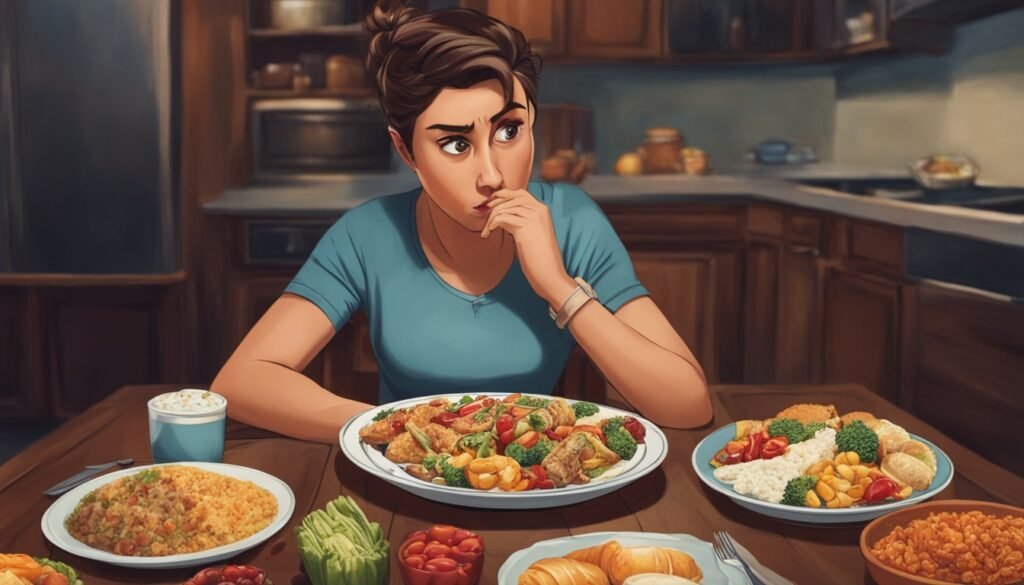
| Nutrient Deficiency | Potential Impact |
|---|---|
| Fiber | Slowed digestion, constipation |
| Iron | Anemia, fatigue |
| Vitamin B12 | Nerve damage, pernicious anemia |
| Folate | Anemia, neural tube defects |
| Vitamin D | Weak bones, increased infection risk |
| Magnesium | Muscle cramps, irregular heartbeat |
Identifying Underlying Causes
Even without gluten, poor digestion may stay. This could be because of issues like not enough stomach acid or lacking pancreatic enzymes needed for digestion. Digestive problems or intestinal damage from conditions such as celiac disease mean your body can’t absorb nutrients right. Also, imbalance in the gut microbiome from things like taking antibiotics might cause diarrhea.
Poor Digestion
Not having enough stomach acid or the right enzymes can keep your body from breaking down food very well. Even if you’re avoiding gluten, this can cause poor digestion and diarrhea. Without proper breakdown and absorption of nutrients, you might not get what your body really needs from food.
Intestinal Damage and Malabsorption
Conditions like celiac disease or leaky gut damage the lining of your intestines. This can stop your body from getting the nutrients it needs. When the part that absorbs nutrients, the intestinal villi, is hurt, you don’t absorb things well. This leads to intestinal damage and problems digesting.
Gut Microbiome Imbalances
When the balance of good and bad bacteria in your gut is off, it can also lead to diarrhea. Even trying to go gluten-free might not help if your gut microbiome isn’t healthy. Things like taking antibiotics, eating poorly, and being stressed can mess up the balance, causing trouble.
Solutions for Diarrhea on a Gluten-Free Diet
Facing diarrhea on a gluten-free diet calls for a full look at solutions. We aim to dial back digestive issues and boost gut health.
Dietary Modifications
Shifting what we eat might ease diarrhea on a gluten-free plan. Keeping a close watch on fats, fibers, and dicey foods can help. Also, trying more soluble fiber from gluten-free sources or cutting down on dairy could pinpoint problem foods.
Supplementation and Probiotics
Adding supplements and probiotics is key for a healthy gut without gluten. Digestive enzymes support nutrient absorption, and probiotics balance the gut. Foods high in probiotics or special probiotic pills can be real game-changers for diarrea sufferers.
Seeking Professional Guidance
Getting expert help from a gastroenterologist or dietitian is crucial. They can dig into the cause, suggest a diet just for you, and outline a treatment plan. Their advice targets symptoms and enhances your gut’s health.
Transitioning to a Gluten-Free Lifestyle
Switching to a gluten-free lifestyle is not easy. It means you need to watch out for gluten in many foods and items. To do well on a gluten-free diet, you must read labels well. You also need to understand how cross-contamination can happen. For instance, food made or served with the same tools where gluten food touched. So, paying close attention to these details keeps your diet truly gluten-free.
Reading Labels and Avoiding Cross-Contamination
Reading labels for hidden gluten is key when you go gluten-free. Be on the lookout, as gluten hides not just in food, but also in makeup. Knowing about cross-contamination helps a lot too. For example, using the same kitchen items for gluten and non-gluten foods can mix them. So, this awareness keeps your diet safe from gluten.
Meal Planning and Preparation
Being gluten-free also means planning meals carefully. You can’t just buy any food since it might contain gluten. This is a chance to try new recipes and gluten-free options. Make sure your meals are full of nutrients too. This fights off any nutritional problems that could come up.
Facing the shift to a gluten-free lifestyle with focus and adaptability works. It requires careful label checking, avoiding where cross-contamination can happen, and smart meal prep. Doing these things turns the challenge into a sustainable, healthy life change.
Maintaining Overall Gut Health
Living gluten-free means more than just fixing diarrhea right now. It’s about keeping our whole gut healthy. This helps us not only get past diarrhea but also feel better all around and use nutrients right.
Adding certain foods to our diet can help our gut heal. Things like fermented veggies, bone broth, and spices that fight inflammation are good. It’s also key to look into any troubles we have digesting food, like not enough stomach acid or enzymes. This is so our body can break down food well and absorb nutrients right.
Looking at the big picture and working closely with health experts can do a lot. It can make diarrhea go away and help us feel better. This mix of careful eating and professional advice is the secret to good gut health and feeling well while being gluten-free.
I’m Dr. Shivani, a Kolkata-based nutritionist since 2015. After 10 years of igniting a love for healthy eating in young minds as a High School nutritionist teacher, I now help individuals unlock their full potential through personalized diet plans. My passion for writing and sharing nutrition knowledge (through blogs and observations) keeps my practice fresh and fuels my love for the field!

